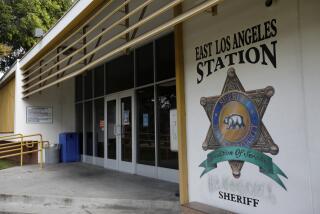FBI Memo Describing Presser Role as Informant Told
- Share via
WASHINGTON — Defense attorneys for Teamsters Union President Jackie Presser have made public an internal FBI memorandum that could complicate the government’s prosecution of Presser on labor racketeering charges.
The memo, included in more than 200 pages of Justice Department documents released in U.S. District Court in Cleveland on Wednesday, was written by an FBI official to then-Director William H. Webster to notify him that the bureau had established guidelines for illegal activities by Presser in his capacity as an informant.
A bureau official said, however, that the government still intends to press its case against Presser. “We contend that the memo has no bearing on this trial,” said John Russell, a departmental press officer. “We intend to go ahead with the prosecution.”
Accused of Padding Payroll
Presser and two other officials of the Teamsters Cleveland Local 507, of which Presser was secretary-treasurer, are charged with padding the local’s payroll by hiring three “ghost workers” linked with organized crime who never showed up for work. They were allegedly paid more than $700,000 between 1972 and 1981.
Presser’s attorneys contend that Presser padded the payroll with the FBI’s knowledge to maintain his credibility among crime figures and, thereby, remain useful to the bureau as an informant. The government contends his actions were not authorized by the FBI.
On Thursday, one of the ghost workers, John A. (Jack) Nardi, 46, pleaded guilty in Cleveland to receiving $109,000 from the union without doing any work. In the plea-bargain agreement, Nardi agreed to testify as a witness for the prosecution.
Presser’s trial is scheduled to begin July 12 in Cleveland. The defense obtained the memo and other papers under pretrial discovery procedures.
The memo was written by Oliver B. Revell, head of the FBI’s criminal division, and sent to Webster, now head of the CIA, on May 10, 1983.
Memo Set Conditions
It set conditions under which Presser would be authorized to engage in illegal activities to conceal his undercover role as an FBI informant. It also proposed that authorization for Presser to engage in illegal activities be “elevated from the field to FBIHQ” (the bureau’s Washington headquarters).
Defense attorneys, in a motion seeking dismissal of the charges against Presser, said the memo indicates that Webster knew in 1983 that Presser was authorized to hire the ghost workers. “If authorization existed, then no crime was committed . . . . “
The exhibit did not indicate whether Webster approved the guidelines. A longhand notation on the paper said that it “was not signed by Director . . . . However document is to be filed for record purposes only.”
The memo was apparently intended to keep Presser from taking advantage of his status as an FBI informant. It said Presser’s assistance was to be “strictly voluntary and will not exempt him from arrest or prosecution for any violation of law” except in instances approved by the FBI under guidelines first established in 1976 for handling such cases. It said Presser should never be considered “an employee or undercover agent of the FBI.”
Bars Use of Violence
The document further instructed Presser to engage in no acts of violence, to initiate no criminal plan, and to obtain no information through unlawful techniques, such as electronic eavesdropping or mail tampering.
The memo authorized Presser to participate in criminal activities of people under investigation, provided the FBI determined in advance that “such participation is necessary to obtain the information needed for purposes of federal prosecution.” It specified that he had no immunity from arrest unless the FBI determined that his participation in criminal activity was “justified.”
More to Read
Sign up for Essential California
The most important California stories and recommendations in your inbox every morning.
You may occasionally receive promotional content from the Los Angeles Times.













